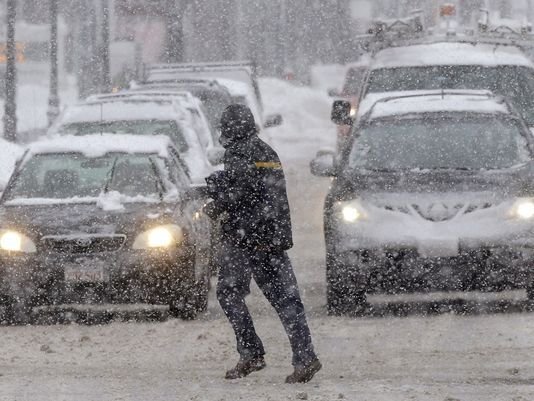
With a huge spring snowstorm hitting the Northeast U.S., a reader asked me to write about “weather anxiety.”
When we talk about “weather anxiety”, it’s not really the weather we’re anxious about. It’s our thoughts about the weather causing the anxiety.
It’s not the weather event itself “making” you anxious. It’s your thoughts. That’s how we explain the fact that different people have different emotional reactions to the weather. You read about people who don’t evacuate even when a deadly hurricane is about to hit them. Others evacuate when told, if not sooner. Different types of thoughts, assumptions and ideas lead to differing emotional reactions and behaviors.
So if you find yourself anxious about the weather, take a sampling of what your thoughts about the weather are. Ask yourself, “What are my ideas and assumptions about the weather? What do I THINK and ASSUME about this weather event?” Humans do not live by emotions alone. It’s not enough merely to feel. When you feel something, you’re also thinking something at the same time, including about the weather.
A lot of the thoughts people have about the weather involve calamity and catastrophe. Within those thoughts exist certain assumptions. One assumption is, “The worst will happen.” Remember that calamity and catastrophe only refer to the worst possible events. We hear of and see these calamities on television and the Internet all the time. Why? Because they’re the most common? No. Precisely because they are unusual.
Our subconscious minds sometimes play a trick on us. Our subconscious minds try to convince us that these unusual, disastrous events are the norm. Media–by its nature–tends to reinforce this fact, because the media calls our attention to the unusual, the exciting and the anxiety-provoking. Actually, and fortunately, the vast majority of weather events do not lead to such calamity. Some do, of course, and it’s wise to take the necessary precautions. But taking precautions is something you can do. It’s something you have control over. Even if some of these precautions seem obsessive, do them anyway, within reason at least, if they make you feel better. Because taking action and getting prepared are great ways to counter anxiety.
Of all the things people cannot control, weather events are the most obvious. Whether it’s an outdoor event rained out by a storm or whether it’s Hurricane Katrina, the principle is the same: There are things in life we cannot control. Perhaps science will reach a point in some distant future when human beings will be able to have a direct and controllable impact on the weather. The likelihood of that, however, is very slim.
Mental health refers to state of serenity. When you have serenity, you’re fully empowered by and confident in the belief that you CAN and WILL control what you’re able to control; but you’re equally calm in accepting what you cannot control. If you find yourself highly anxious and nervous over the weather, try to keep in mind that your thoughts and assumptions are causing this anxiety, and not the weather itself. Take a look at your assumptions and attitudes not just about the weather, but regarding control of your own destiny, as well. A reflective examination of your subconscious, not just once but on a regular basis, can make coping with daily life — including the weather — a lot more manageable than you might think.
Follow Dr. Hurd on Facebook. Search under “Michael Hurd” (Rehoboth Beach DE). Get up-to-the-minute postings, recommended articles and links, and engage in back-and-forth discussion with Dr. Hurd on topics of interest. Also follow Dr. Hurd on Twitter at @MichaelJHurd1
Check out Dr. Hurd’s latest Newsmax Insider column here!
Dr. Hurd’s writings read on the air by Rush Limbaugh! Read more HERE.
